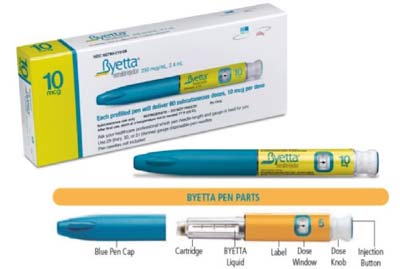
About Byetta (exenatide)
Amylin Pharmaceuticals/ Eli Lilly & Co.
Amylin Pharmaceuticals/ Eli Lilly & Co.
|
|
||||
|
Incretins, such as glucagon-like peptide-1 (GLP-1), are hormones released from the gut in response to food intake. GLP-1 functions to control blood sugar levels by increasing insulin secretion from the pancreas, decreasing the release of glucagon (a hormone which controls the release of glucose from the liver after meals), promoting a feeling of fullness after eating a meal, and slowing the emptying of the stomach’s contents to allow more time for food absorption. GLP-1 is rapidly broken down in the body by the actions of dipeptidyl peptidase-4 (DPP-4). GLP-1 is deficient in individuals with diabetes. Byetta belongs to a class of medications known as incretin mimetics. It is prescribed, in addition to diet and exercise, to improve glucose control in adults with type 2 diabetes. This type of medication improves blood sugar levels by copying the effects of naturally occurring GLP-1. The difference between Byetta and natural GLP-1 is that Byetta is resistant to breakdown by DPP-4. Therefore, Byetta injections allow individuals with type 2 diabetes to achieve high levels of GLP-1 for long periods of time, which in turn lowers blood glucose levels. Byetta may be used in combination with metformin, sulfonylureas, or thiazolidinediones. Byetta lowers blood sugar levels in a glucose dependent manner. This means that Byetta increases insulin secretion from the pancreas only when glucose levels are high. This medication therefore is not likely to cause low blood sugar (hypoglycemia).  Byetta works by:
Before Taking Byetta Before taking Byetta, be sure to tell your doctor about all medications you are currently taking, including prescription and non-prescription medications, vitamins, and herbal supplements. Tell your doctor if you are pregnant or planning to become pregnant, or if you are breastfeeding. Dosage and Forms Byetta is a subcutaneous (under the skin) injection that is given twice daily; usually within 60 minutes before morning and evening meals, unless otherwise instructed by a physician. Byetta should not be administered after a meal. The initial dose of Byetta is 5mcg injected twice daily. After one month, the dose may be increased to 10mcg injected twice daily. Byetta is supplied as 250mcg/mL exenatide in:
Like all medications, Byetta may have unwanted side effects for some people. The most common of these include:
Talk to your doctor if you are experiencing any of the above conditions, or any other bothersome side effects while using Byetta. Ingredients Active ingredients: exenatide Inactive Ingredients: metacresol, mannitol, glacial acetic acid, and sodium acetate trihydrate in water for injection Storage and Handling
|
||||